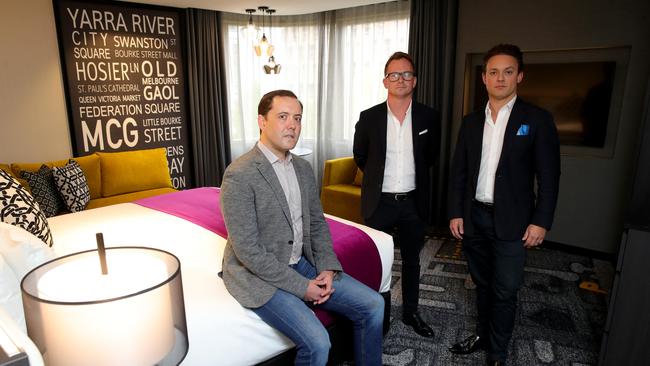Coronavirus: Hotels could take the load off hospitals
At least five hotels could be transformed into hospitals within two days under a plan to put empty rooms to use.

At least five hotels could be transformed into hospitals within two days under a plan to put empty rooms and beds across the country to use.
Non-virus patients would be moved into the hotels under the plan put together by three Melbourne entrepreneurs, freeing up much-needed hospital space for people infected with COVID-19.
The plan, which already has hotel chain giant Accor on board, has locked in mobile nurses, healthcare workers and caregivers, security staff, cleaning companies and medical transport providers.
Based in part on hotels that offer maternity services for those at low risk after giving birth, the plan will be tested this week by one Melbourne hospital and potentially several hotels in or around the CBD, including the Pullman on Swanston.
“We already have one hospital with 200 patients ready to go straight away,” Melbourne businessman and hotel owner Ben Beck said.
“The model will mean that hotels can cushion the pressure on government resources or hospital administration as well as operational staff — and would operate as a patient overflow model in times of surge for lower-care patients who would normally fill hospital beds.”
Mr Beck is the owner of electricity and utility network operator Active Utilities, part-owned by Macquarie Bank, and son of The List — Australia’s Richest 250 member Max Beck, whose family owns the Hyatt Hotel at Essendon Fields.
He has formed Response.Org. Au with Tull Roseby, founder of in-home care and disability support services firm Absolute Care & Health, and Hugh Evans, the chief executive of business design consultancy From Here On.
Their plan is to work with state and federal governments to convert 3½ and 4-star hotels, preferably near hospitals, to create managed care facilities staffed by qualified nurses and carers, sourced and provided by home-care services networks.
“We have had a lot of interest from hotel chains and hotel owners, and hospital CEOs and operating officers are also keen,” Mr Beck said.
“We have also got security companies and health transport companies locked in, and cleaning agencies, given hospitals have to have a higher level of specialised cleaning.”
They have presented plans to state government health ministers, starting with their home state of Victoria, and say they have sent the proposal to federal minister Greg Hunt.
Mr Beck said “care units” would be established, with six patients for each nurse or caregiver at each facility. The care units would be located on dedicated floors in hotels well away from normal hotel patrons or they could take over entire hotels, depending on demand.
The plan could be scaled up quickly and the first care units in hotels could be established within two to three weeks. The group already has capacity to provide between 300 and 500 nurses and caregivers as a mobile workforce.
ASX-listed Apollo Caravans has also offered its vehicles for mobile patient isolation units if needed.
Mr Beck said his group had also arranged for personal protective equipment, which could be quickly moved to hotels without large refit costs.
“The group knows that bed flow within hospitals has been an issue in Australia for many years, but have now come together in this time of crisis to build a sustainable model that will operate, even after the COVID-19 crisis is gone,” Mr Beck said.
“This model also assists the hotel industry, assisting to employ various staff to help support the concept — as clearly many hotels are looking to close, so people in beds gives them the opportunity to stay open and keep employing staff.”




To join the conversation, please log in. Don't have an account? Register
Join the conversation, you are commenting as Logout